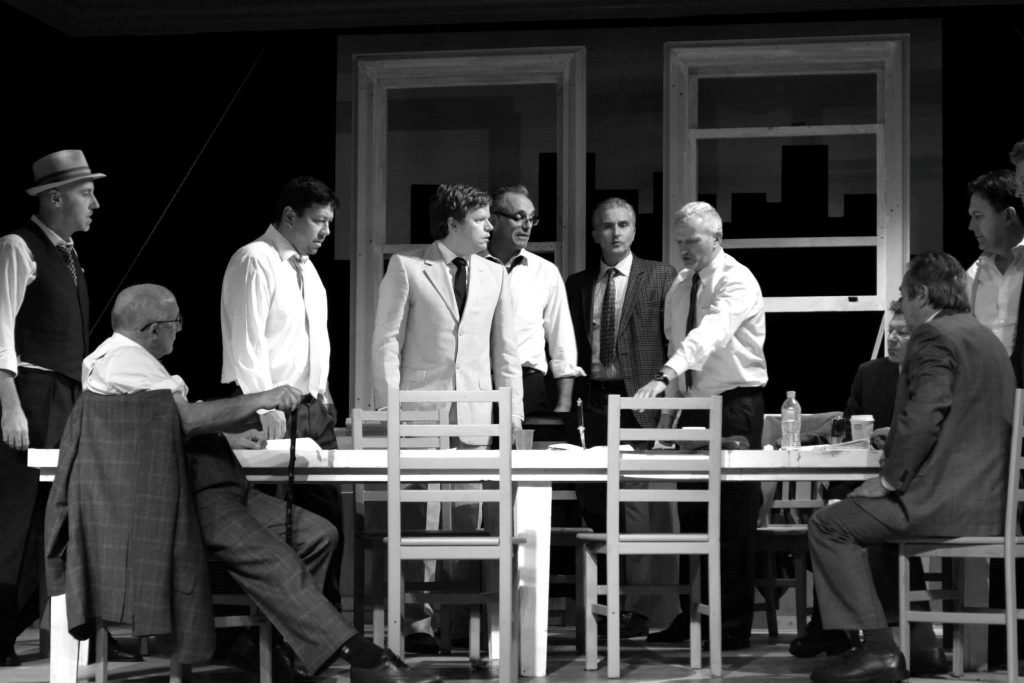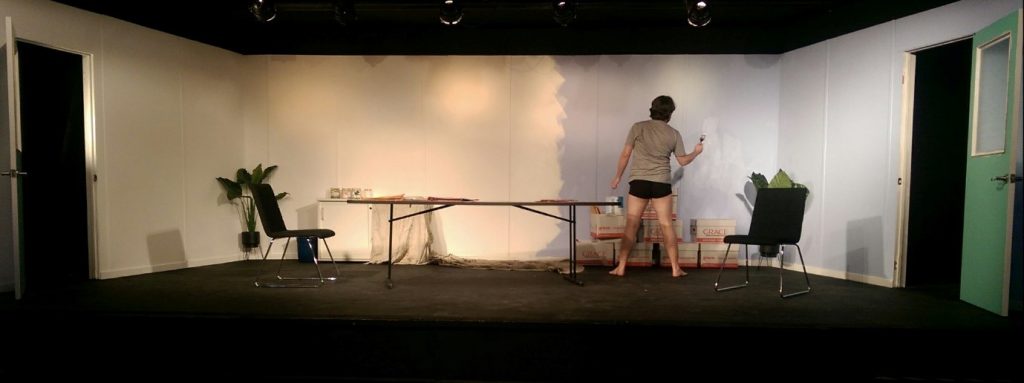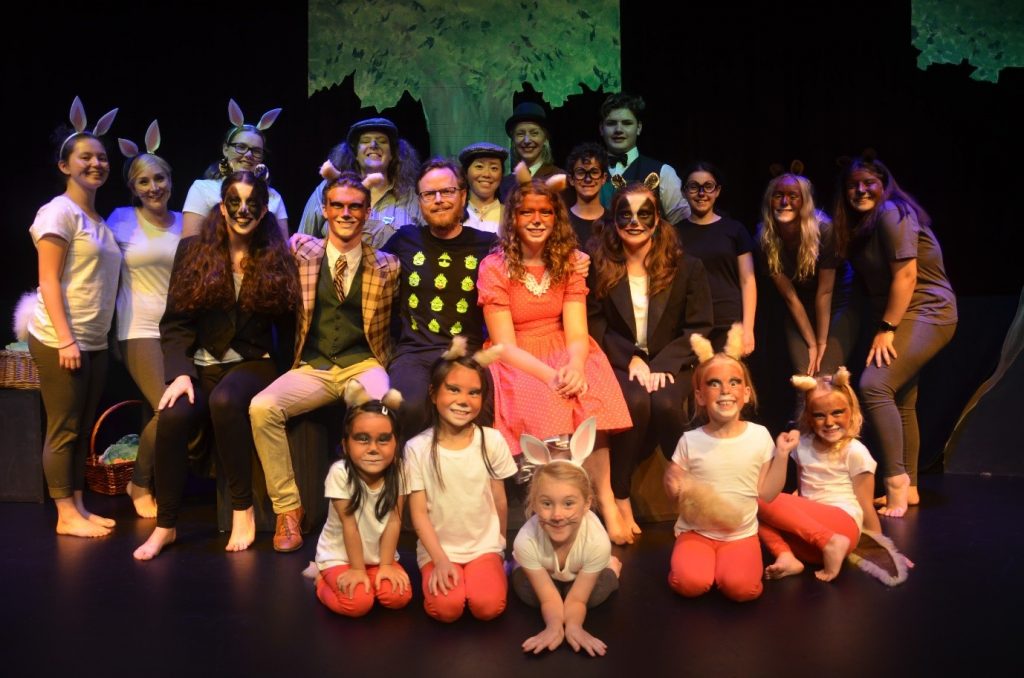
In a few short years David (Div) Collins has become one of the most visible people in the Melbourne theatre scene as actor, director, award winning playwright, VDL adjudicator and reviewer, and now, President of Encore Theatre.
In 2020 he was scheduled to direct for five companies before pandemic restrictions shut down all but one of these productions. This suggested, that apart from a full-time job, he had a little more time than usual, so VDL President Bruce Cochrane took the opportunity to find out what makes him tick.
BRUCE: How did your alias of ‘Div’ originate?
DAVID: My earliest memory of it is my sister using it, then a friend took that baton and started using it throughout high school, which got me to University and eventually my first theatre class where I introduced myself as Div. Unfortunately, it was only years later that I discovered it was U.K. slang for “idiot” or “moron”. Goodness knows there have been times I’ve probably more than earned that definition, but for the most part it remains what most friends and theatre collaborators call me.
BRUCE: So, somewhere along the way you decided that it was time to live ‘across the ditch.’ How did you choose Melbourne?
DAVID: I first visited Melbourne in 2010, then again in 2012 and by then my heart was lost. I only had a short time to experience its diverse and extraordinary arts scene, but it was long enough to know in 2013 that I had to move here (there may also have been a girl involved in that decision, which at the time certainly made the equation more attractive).
BRUCE: Did you really expect to be so fully immersed so quickly in theatre here as you’ve become?
DAVID: All I knew was I wanted to act and direct and review and… anything else that interested me, so I threw myself into whatever caught my eye and imagination. Thankfully, being new in town meant I was ignorant of how far away some theatres were from where I was living (e.g. commuting between North Coburg and Lilydale to act in Twelve Angry Men in 2014), otherwise my immersion may have taken a little longer.

Reviewing for Theatrecraft also helped immeasurably in that regard, allowing me more opportunities to travel the city as a critic as well as an actor/director. It gave me the chance to get meet other creators and get a strong feel for each company’s pedigree and flavour.
BRUCE: Yes, because you’ve really covered the full spectrum of theatre, how did that come about?
DAVID: I’ve always been fascinated by storytelling, yet, as an extreme introvert growing up, I never felt I had a voice or the means to express myself. Some writers’ first piece of advice to aspiring authors is to read and read as much as possible across a wide range of styles, types, and genres. When I discovered theatre – not only how much I loved watching it but also being involved in the creative process, learning how to craft stories – I felt a similar impulse: that the best way to approach it was from as many angles as possible – whether acting, directing, playwriting, reviewing, adjudicating, or even stage crew on a lone (David Bowie related) occasion. It’s all fascinating, humbling, educational, and wonderful.

BRUCE: Having served as a VDL adjudicator, you’ve visited a lot of city and regional companies,what’s your perspective on the future for community theatre in Victoria and Melbourne?
DAVID: One of the most important qualities of community theatre (and something I continue to marvel at) is that we’re all volunteers. None of us have to be involved onstage, backstage, or in the audience, but we do it because we’re enthusiastic about it. If we can share that enthusiasm with the wider community and continue to engage and entertain them, then I think the future will be very bright indeed.
BRUCE: What would you like to see the VDL doing more of?
DAVID: Besides the tremendous work the VDL already does in supporting the various theatres in its network, I am amazed – in all the independent and professional shows I see – how many people are unaware of a community theatre scene at all. Individual theatres must have their own strategies to engage their wider communities, but I wonder what scope there may be for the VDL to help get the word out. More awareness means more volunteers and audience, which means we’re all able to keep the lights on and shining bright.
BRUCE: As the president at Encore Theatre, a long-established company, what’s your strategy for future growth?
DAVID: Well, first there’s the bloody great COVID19 spanner thrown into the works that we must deal with. Once that’s out of the way, we begin the business of safely getting our patrons involved with all facets of Encore again. I recently had an experience representing Encore Theatre at an arts expo run by the Monash Council. I lost count of how many local residents I would speak to who had no idea there was a community theatre on their doorstep (and had been for years!), so certainly that awareness is something we need to address.
I think there’s room for a theatre to grow artistically as well as monetarily. Far too many scripts are never read or staged because they’re seen as not popular enough, too difficult, too controversial, or not for a company’s so-called “audience”. Audience appeal is a peculiar thing and while obviously it has to be considered when planning a playbill, it shouldn’t be at the expense of never taking risks or producing a show that hasn’t been done before.
BRUCE: For your production of Fantastic Mr Fox at Encore earlier this year you had responsibility for a massive number of cast and crew. How did that compare with learning lines and moves for a personal role?

DAVID: Unlike a personal role where you are mainly responsible for your own role and how that character moves and plays in a scene, as the director – whether a large number of cast and crew or not – you’re responsible for the vision of the entire play: What does it look like? What does sound like? And, most importantly, what does it feel like? And once you have that, then not only do you have to find a way to communicate that vision, you also must make peace with the fact there will be compromises along the way to opening night.
Fantastic Mr Fox was an enormous undertaking, helped tremendously by a talented cast and professional crew. We had 21 performers between the ages of 4 – 45ish, including four mums (three of whom had daughters in the show) who helped with any wrangling that was needed. Everyone involved with the show understood what I was trying to build and their passion and commitment to that vision made for one of my most rewarding experiences as a director.
BRUCE: Will we see Div Collins maintain the pace in all areas of Melbourne community theatre in the future?
DAVID: Being an actor and director is tricky (let alone president of a theatre company as well), particularly when looking ahead and considering my workload. All companies generally run 12-24 months ahead in terms of planning their playbills, whereas actors can see an audition for a show listed and potentially 3-4 months later be taking their final night bows, having successfully auditioned, rehearsed, and performed in that small space of time. There are still theatres I haven’t directed at that I would love an opportunity to approach. To do that I need to keep adding to my body of work and keep building a reputation as a passionate artist who always has a Kiwi-authored script or two in his back pocket. So, the short answer is… until further notice.
BRUCE: Well, congratulations on your work to date and all the best for the future.
DAVID: Thank you, Bruce!
